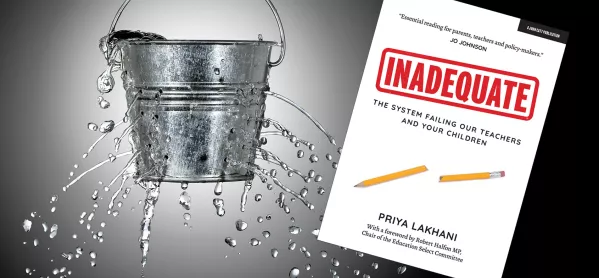- Home
- Book review: Inadequate
Book review: Inadequate

Inadequate: the system failing our teachers and your children
Author: Priya Lakhani
Publisher: John Catt
Details: 156pp; £9.99
ISBN 978-1912906222
Towards the end of Inadequate: the system failing our teachers and your children, Priya Lakhani, an artificial intelligence entrepreneur, concludes that one of the ways we can fix our “broken” education system is - yup, you’ve guessed it - by using artificial intelligence.
For Lakhani, the founder of the rather shouty, always-capitalised CENTURY (“the tried and tested intelligent intervention tool”), schools should get ready for Education 4.0 (I must have missed the previous upgrades). And, in this glorious steel-and-glass future, young people will be able to arrive in school and “use big data to tell them exactly which room to visit to address their individual learning needs”.
Such solutionism is a perfect encapsulation of why people involved in selling technology should be kept away from shaping education policy.
Unintentionally, it reveals three key points. Firstly, the “solution” identifies a problem that does not exist: a printed timetable and a teacher will do exactly the same thing (but without the risk of crashing). Secondly, it’s more expensive than what it seeks to replace. Thirdly, it benefits those who sell the solution, not those who use it. Look into those school store cupboards, those places where other tech solutions went to die, and weep at the money wasted.
An inability to formulate anything radical or new
That Lakhani feels that she is qualified to write this book is never in doubt: we are regularly reminded by her of her many achievements, whether it is as a trustee of the Teaching Awards Trust, as the sponsor to the Thank a Teacher campaign, or as a tech entrepreneur, a former adviser to the coalition government, to her involvement on the UK’s AI Council, as well as being the co-founder of the Institute for Ethical AI in Education. Impressive credentials indeed, which is why the author’s inability to formulate anything truly radical or new is so frustrating - and surprising.
Inadequate is the latest in a growing library of articles and books written by people who seem to have no experience of classroom teaching or running a school, but clearly take delight in telling us teachers how broken, useless, flawed and damaging the system we have spent our lives creating and sustaining really is.
She trots out the familiar complaints: that the “delivery of education has not fundamentally changed since the Industrial Revolution”; that it is “not fit for purpose”; that it is “utilitarian”; that cramming for high-stakes exams “permanently damages” students’ attitude to learning; that teachers should be “set free” to explore our own creativity. No progressive idea of education is left unvisited; each (to use a rather tired metaphor) is reheated, stirred up and served as if they were something fresh.
But there is nothing new here, not even the language. Clichés weigh down each page. Lakhani is on an “evangelical mission” to transform education “from the ground up”; she wants to “shine a light” on this failing system and start a “paradigm shift” on “a scale never seen before”.
We learn that we’re “going to have to start over afresh” because Covid-19 may have delivered a “knockout punch” to a system that is “not fit for purpose”. We read that teachers are “voting with their feet” (which really would be a creative act), but that if we “think outside the box” and “throw the barnacles off the educational boat”, “work smarter, not harder”, then, well, “the future is in our hands”.
Bogus and ill-informed claims
But even easy targets and tired language would be forgivable if the answers being provided were something new. Indeed, Lakhani’s main “arguments” can be summarised in the five points she puts forward four pages from the end: cut down the curriculum; get rid of high-stakes examinations (to replace them with something low stakes and, not surprisingly, “enabled by technology”); trust teachers more; support students; use some AI.
Worse still, many of Lakhani’s claims are bogus, ill-informed or self-serving. Only conspiracy theorists or those who have no experience of schools could seriously claim that “the educational system…seeks to restrict teachers’ every move”. It simply doesn’t.
And only someone who has spent more time in a boardroom than a classroom could write in all seriousness that “most people have a LinkedIn profile”, and that such a model could replace GCSEs and A levels.
If only we could find someone to design something similar for students (well, we’re in luck, because there is one, called CENTURY, which is very convenient). She even describes the teaching unions as having a power “that cannot be underestimated”, reminding us that those activists who trapped David Blunkett, and his guide dog, Lucy, in a room are “formidable forces”, rather than the cowardly bullies they really were.
All this is a great shame, because Lakhani is someone with immense drive, imagination and ability. She has already done more in her life than many people could ever dream of achieving, and many have benefited from her work. And her intentions are clearly well meant and passionately held.
But school leaders, students and parents, more than at any point in recent history, crave nothing more now than stability, the familiar and reliable. Risk, radical innovation and invention can wait.
The school system that has for decades been routinely condemned as inadequate now looks surprisingly desirable and more treasured than ever.
David James is deputy head of an independent school in London. He tweets as @drdavidajames
Keep reading for just £1 per month
You've reached your limit of free articles this month. Subscribe for £1 per month for three months and get:
- Unlimited access to all Tes magazine content
- Exclusive subscriber-only stories
- Award-winning email newsletters



